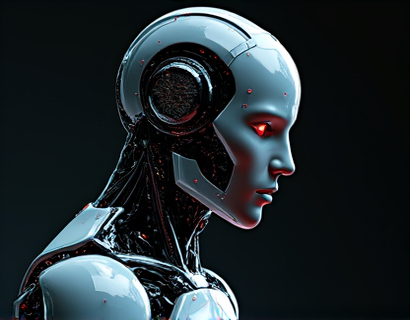AI-Powered Software: Revolutionizing Digital Business Growth Through Intelligent Automation and Data Insights
In the rapidly evolving digital landscape, businesses are increasingly turning to AI-powered software to gain a competitive edge. This transformative technology is not just a buzzword but a practical solution that enhances operational efficiency, drives strategic growth, and delivers actionable insights. The integration of artificial intelligence into digital business processes is revolutionizing the way companies operate, making it essential for any business aiming for success in the modern market.
The Role of AI in Automating Business Processes
One of the most significant impacts of AI-powered software is in the automation of repetitive and time-consuming tasks. Traditional business processes often involve manual data entry, report generation, and routine monitoring, which can be error-prone and inefficient. AI-driven automation tools can take over these tasks, executing them with precision and speed. For instance, robotic process automation (RPA) uses AI to simulate human actions in software applications, allowing for the automation of complex business processes without human intervention.
By automating these tasks, businesses can free up valuable resources, reducing the workload on employees and minimizing the risk of human error. This not only improves accuracy but also allows staff to focus on more strategic and creative tasks that add greater value to the business. The efficiency gains from automation are substantial, leading to faster turnaround times and improved customer satisfaction.
Enhancing Decision-Making with Data Insights
AI-powered software goes beyond automation by providing deep data insights that drive informed decision-making. Traditional data analysis methods can be time-consuming and often overlook critical patterns and trends. Machine learning algorithms, a subset of AI, can process vast amounts of data quickly and identify insights that would be impossible for humans to detect manually. These insights can inform strategic decisions, optimize operations, and open up new revenue opportunities.
For example, predictive analytics uses historical data to forecast future trends and behaviors. This can help businesses anticipate market changes, customer needs, and potential risks. By leveraging these insights, companies can make proactive decisions, stay ahead of the competition, and adapt to dynamic market conditions. Data-driven decision-making is no longer a luxury but a necessity for businesses aiming to thrive in the digital age.
Improving Operational Efficiency
Operational efficiency is a key factor in the success of any digital business. AI-powered software can optimize various aspects of business operations, from supply chain management to customer service. In supply chain management, AI can predict demand, optimize inventory levels, and streamline logistics, reducing costs and improving delivery times. This level of optimization ensures that businesses can respond quickly to changes in demand and maintain a smooth flow of goods and services.
In customer service, AI-driven chatbots and virtual assistants can handle a high volume of inquiries, providing instant responses and personalized experiences. These tools can operate 24/7, ensuring that customer needs are met at any time, which significantly enhances customer satisfaction and loyalty. By automating routine customer interactions, human agents can focus on more complex and high-value tasks, further improving service quality.
Fostering Innovation and Competitive Advantage
AI-powered software is not just about efficiency and insights; it is also a catalyst for innovation. Businesses that embrace AI can develop new products and services, create unique customer experiences, and explore untapped markets. For instance, AI can be used to analyze consumer behavior and preferences, enabling companies to design products that better meet market needs. This customer-centric approach can lead to the creation of innovative solutions that set a business apart from its competitors.
Moreover, AI can help businesses stay ahead of industry trends and technological advancements. By continuously learning and adapting, AI systems can identify emerging opportunities and potential threats, allowing companies to pivot quickly and maintain a competitive edge. This agility is crucial in a market where change is the only constant, and the ability to adapt can mean the difference between success and failure.
Challenges and Considerations
While the benefits of AI-powered software are clear, businesses must also be aware of the challenges and considerations involved in implementing these technologies. One of the primary concerns is data privacy and security. AI systems require access to large amounts of data, which must be handled with care to protect sensitive information. Companies must invest in robust security measures and comply with data protection regulations to build trust with customers and avoid legal issues.
Another challenge is the need for skilled personnel to develop, maintain, and optimize AI systems. The AI talent gap is a real issue, and businesses may need to invest in training or hire experts to ensure the successful implementation of AI solutions. Additionally, there is a risk of over-reliance on AI, where human judgment and creativity are overshadowed by algorithmic efficiency. Striking the right balance between automation and human oversight is essential for sustainable growth.
Case Studies and Real-World Applications
To better understand the impact of AI-powered software, let's look at some real-world examples. In the retail sector, a major e-commerce platform implemented AI-driven recommendation engines to personalize the shopping experience for its customers. By analyzing browsing and purchase history, the system suggests products that are likely to interest each user, increasing engagement and conversion rates. This AI-powered personalization has led to a significant boost in sales and customer loyalty.
In the manufacturing industry, a leading automotive company used AI to optimize its production line. By analyzing real-time data from sensors and machinery, the AI system identified inefficiencies and predicted maintenance needs before equipment failures occurred. This proactive approach reduced downtime, lowered maintenance costs, and improved overall production efficiency. The company reported a substantial increase in output and a reduction in operational expenses.
In the financial sector, AI-powered fraud detection systems have become indispensable. These systems use machine learning algorithms to monitor transactions in real-time, identifying suspicious patterns and flagging potential fraud. This has greatly enhanced the security of financial transactions and helped institutions comply with regulatory requirements. The ability to detect and prevent fraud quickly and accurately has become a key differentiator for financial services providers.
The Future of AI in Digital Business
As AI technology continues to advance, its role in digital business will only become more prominent. Future developments in natural language processing, computer vision, and autonomous systems will open up new possibilities for businesses. For example, AI-powered virtual reality and augmented reality experiences can revolutionize how companies engage with customers, creating immersive and interactive environments that enhance brand loyalty and customer satisfaction.
Additionally, the integration of AI with other emerging technologies like the Internet of Things (IoT) and blockchain will create even more powerful solutions. IoT devices can generate vast amounts of data that AI can analyze to optimize operations and provide real-time insights. Blockchain can ensure the integrity and security of data used by AI systems, further enhancing trust and reliability.
The future of AI in digital business is not just about technology but also about creating a culture of innovation and continuous improvement. Companies that embrace AI and foster a data-driven mindset will be better positioned to navigate the complexities of the digital market and achieve long-term success.
In conclusion, AI-powered software is a game-changer for digital businesses, offering unparalleled opportunities for growth and efficiency. By automating processes, delivering data-driven insights, and fostering innovation, AI is transforming the way businesses operate and compete. As the digital landscape continues to evolve, the strategic adoption of AI will be essential for any business aiming to thrive in the years to come.











































